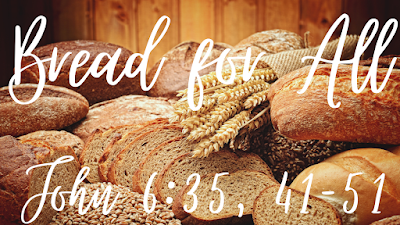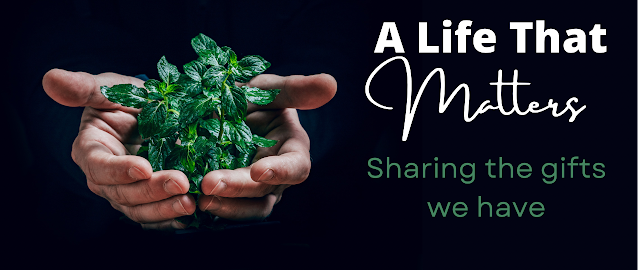Bread for All (or, Exploring the Spiritual Depth of Jesus as the Bread of Life: A Faith Perspective on Global Food Issues) - John 6:35, 41-51 (Proper 14B)
My wife and I were trying to put Aaron to bed the other night. As soon as we wanted to get his pajamas on, he shouts, “I’m hungry!!!” It’s a pretty common experience in my house, and Aaron isn’t known for being the most consistent eater. So I said, had you eaten your dinner, you probably wouldn’t be hungry right now. Then it hit me. This is kind of what Jesus is saying in this passage for our gospel reading today.
As we left off last week, the people are standing right in front of Jesus, wanting him to fulfill all their earthly needs, not even realizing what else heaven could be asking of them. And they’re saying, “I’m still hungry!!!” And Jesus shouting back, like a parent tired of arguing with their child, “I AM THE BREAD OF LIFE!! I’M RIGHT HERE!! Let me teach you; let me feed your brains and hearts and souls.” Now, this is maybe a bit of a leap, but as children of God, that perhaps rings more true than I want it to, even for me.
The crowd has gone from searching for Jesus to finding him. But they are still complaining. Their complaints shift from making him their leader by force to how can we trust this guy, even when we know his parents? The crowd is identifying Jesus by his earthly parents, which is a way to undermine his divinity. They want to make sure we know of him as a “historical Jesus” versus knowing him as “the plan of salvation.” Still - those in the crowd may be a bit narrow-minded about who this Jesus is. As I was reading through it, I caught the bit in verse 42, where the people start talking about Jesus in relational terms - “whoa, Jesus, I mean - I thought I knew you, you’re the son of Joseph & Mary? How can you say that’s not true?” Jesus’ words create tension with those who object to him making such claims. This text acknowledges that the uniqueness of Jesus and causes a divide between those who accept Jesus’ identity and those who don’t. This passage does not try to explain why some believe and others don’t, except to note that those who truly believe in Jesus do so by God’s power. Jesus also states that believing in him as the one who is the bread of life gives not just life, but eternal life. This result is not for a future time, but for NOW. It is not for us to understand how one comes to believe in Jesus, except to know it’s a gift from God.
Some of the leaders of the crowd did not like what he was saying. They questioned and undermined his claim of divinity. I feel like this needs to be said more often. We know Jesus as our salvation, as God’s only chosen Son, that he brought God to earth for our redemption. But people who were living at the time didn’t have the whole picture. They were taking his words at face value, only knowing what they know. Those in the crowds at the miracles didn’t realize that he would be crucified, left to die, and most importantly, be resurrected on the third day. There is much more to this story that we have left to tell. We have the benefit of being an Easter people. To be witness to a resurrection that [slow] changed the course of history. We may not have been direct witnesses, but hopefully it is the good news brings us here on Sunday mornings.
On the other hand, let’s admit something completely human. On some level, we like our gods to be removed, distant, high in heaven. We don't want them to know our gritty realities. We might be ashamed at the way we act, knowing it is not the most holy. But Jesus walked with us. He was among us, not only physically, but inside and out. He knew what it was like to be on Earth. Even with our disobedience and unfaithfulness, he loves us. The love that God sent is boundless, reckless, and unchanging. There isn’t anything that will keep Jesus from pursuing you. And that, my friends, is the mystery of faith and the BEST news, not just good news. As my daughter might say, Best news ever.
Over the last couple of weeks, let’s review a bit of what we’ve learned. I’ve talked about both food insecurity and food deserts. You’ve heard the stats that one in three in our county lack either resources or accessibility to fresh, healthy food. Look to your left, look to your right; if it’s not you, it might be one of them.
When you were growing up, did you ever hear or or say that kids should eat their dinner because there are less fortunate children starving in Africa? It’s a good and compassionate thought. But also in that thought, there is more guilt because it’s not like we can send our leftovers to Africa, and even if we do, why would they eat our food? I understand that if there are starving children, but it doesn’t erase their own cultural and culinary heritage that has existed for generations.
Do you think that there is a world food shortage? It may be seem reasonable to think, but this is false. Our distribution is such that the makers want to profit off their creations, so they set the price too high for everyone, including those around the globe who cannot support first-world costs. Is there not enough land to grow all the food? There is, by we have set up the ground to develop and produce many different things. Still, when economics gets applied, it will go to whatever can get the most profit, even if it’s not beneficial to the local community. In addition to that, with our climate changing rapidly, places that were fertile a generation ago may not be now. There are some parts of the world where overgrazing and erosion are happening due to a poor understanding of soil conservation. Big business says to use a plot of land to grow a specific grain over and over again. But over time, the same crop will strip the soil of essential nutrients and the crop will produce less.
But, if we grow more food, can we deliver it to those who need it? Still, the distribution and economics kicks in because buyers and sellers are more looking for their own interests and wallets than benevolence towards the underprivileged. Or even if we teach those in third world countries how to grow food, their infrastructure may not support the increased supply either, which means the food is going to rot or be too inefficient to be good for those communities.
Well - what can our church do at a time like this? It seems overwhelming, for just this one issue. Not to mention how many other issues… But isn't it terrible that we need to explain to others that providing a basic level of living is moral and good? We could raise the money that we talked about the first week of the series or we could help provide resources and make sure we are fulfilling our mission in our neighborhood, but it seems to me like we should do more! Prayer is an essential resource. Hope and faith will guide us through to see the message God is sending us. We can hope beyond hope that goodness will come to the people whom God loves - which is everyone, by the way - we need to walk in the faith that these seeds that we plant will grow in our community and help feed even more. The walk is hard. We are all impatient - just as the crowd was who was visiting with Jesus - but God knows all and is at the end of the story. We know God is working in and with us. We pray that our hands and feet are the very vehicles of God’s mercy and grace.
So - assuming these things are true, as people of faith - can we look around us to find where God is working and how these works may be questioned by those who may just not understand? Do we need to be more faithful servants and help clean up confusion as the places where God is working? Can we submit to the truth that God is the creator of all things and through that submission for all things - including the deep and most-pressing concerns - that God can take it and make it work for His glory?
As I alluded to earlier, this food series can seem overwhelming, considering the global scope of the need. So let’s bring it back to a scale that seems manageable. What can we do for those around us, closest in proximity? But those who can hear me, what if each of you did one small thing, which gave you enough confidence to do a bigger thing? Sometimes the steps of faith are tiny; sometimes they really stretch our legs.
Eternal life is given from the living Word who comes from the mouth of God, not an endless supply of food. Jesus stops the initial work (serving loaves) when it no longer results in His goals (creating relationships with God). Any competent worker would do the same. If adding more salt doesn't make the soup better, a decent cook stops adding salt. Or a waiter isn’t going to serve food that someone is knowingly allergic to. Jesus doesn’t mean “stop working,” but quit working for more stuff (food) when more isn’t what you need. This may sound too obvious for God to tell us, but who doesn’t need to hear that truth again this very day? We might also ask the question, "What is the distinction between food that perishes and food that endures for eternal life?" Listening to Jesus, food that perishes is food that merely fills you up. It makes you feel good, but will not last and you'll be hungry again. This could be working just for a paycheck, with no interest for the importance of the work, no matter what the task. By contrast, working for food that provides for eternal life, is similar to work that fulfills God’s purposes.
According to the Bible, belief is not just scholarly agreement, but includes devoted effort. Belief in the one whom God has sent is not merely to accept that Jesus is the Son of God, but also to pursue Jesus by doing the work that God intends for us.
God's purposes for work being lowered simply to belief, this must be viewed against the everything else in the Gospel and the theology of John’s letters. John writes happily about pushing things to extremes. On the one hand, his take on God’s freedom and imagination leads him to uplift a humble dependence on God. But on the other, God’s work on our collective behalf is limitess—we need only to believe and submit to the work of God through Christ, another mystery of faith is found in between.
Jesus used simple references in his stories so people could see God in the world around them as it is, not as some special place or disconnected practices. The more fully you see how the Spirit can enter your life, whether through the water cleaning you in the shower or washing dishes, or the food that will be eaten here in a little while at the sip and chatter or at your dinner during the week, acknowledging how close the Kingdom of God is can serve as a great reminder how present God’s love is.



Comments
Post a Comment